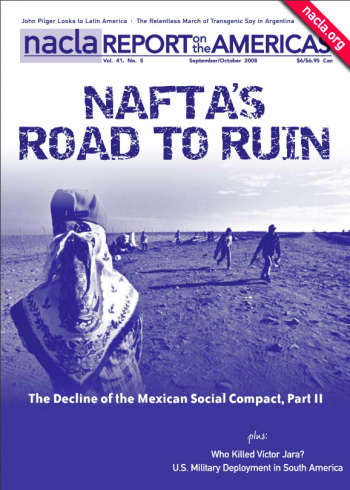Report
The Security and Prosperity Partnership (SPP), launched in 2005 by the NAFTA countries, aims to securitize the “shared economic space” of Canada, Mexico, and the United States. This has profound implications for Mexico, whose shaky democracy could regress to presidential authoritarianism, with explicit U.S. support.
Free trade has devastated the Mexican countryside, as cheap, highly subsidized U.S. grains have flooded the market, underselling domestic producers. The campesinos either migrate or remain, surviving on subsistence consumption and the unprofitable sale of their surpluses.
Since the passage of the North American Free Trade Agreement (NAFTA) in 1993, the U.S. Congress has debated and passed several new bilateral trade agreements with Peru, Jordan and Chile, as well as the Central American Free Trade Agreement. Congressional debates over immigration policy have proceeded as though those trade agreements bore no relationship to the waves of displaced people migrating to the United States, looking for work.
Despite Mexico’s much vaunted “transition to democracy,” true citizen participation remains weak and problematic. Much of this can be traced to the effects of neoliberal policy, as Mexican politics has effectively been sequestered by a minority unaccountable to popular demands.
Oil has sustained the Mexican economy since 1938, when the state oil company, Pemex, was founded following a national expropriation from foreign companies. Now the Calderón government is bent on reprivatizing it in the name of efficiency—and profits on the commission of its sale.
Benedicto Martínez, a leader of Mexico’s Authentic Workers Front (FAT), talks to NACLA about the bleak prospects faced by workers in an age of global labor markets and an anti-labor state.

